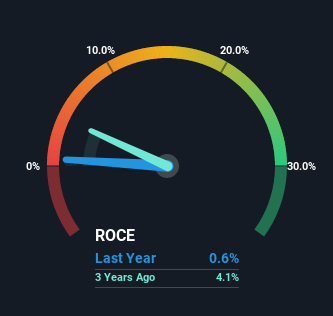- Hong Kong
- /
- Oil and Gas
- /
- SEHK:1138
COSCO SHIPPING Energy Transportation (HKG:1138) Will Be Hoping To Turn Its Returns On Capital Around

To avoid investing in a business that's in decline, there's a few financial metrics that can provide early indications of aging. More often than not, we'll see a declining return on capital employed (ROCE) and a declining amount of capital employed. Trends like this ultimately mean the business is reducing its investments and also earning less on what it has invested. So after glancing at the trends within COSCO SHIPPING Energy Transportation (HKG:1138), we weren't too hopeful.
What Is Return On Capital Employed (ROCE)?
Just to clarify if you're unsure, ROCE is a metric for evaluating how much pre-tax income (in percentage terms) a company earns on the capital invested in its business. Analysts use this formula to calculate it for COSCO SHIPPING Energy Transportation:
Return on Capital Employed = Earnings Before Interest and Tax (EBIT) ÷ (Total Assets - Current Liabilities)
0.006 = CN¥334m ÷ (CN¥66b - CN¥11b) (Based on the trailing twelve months to September 2022).
So, COSCO SHIPPING Energy Transportation has an ROCE of 0.6%. Ultimately, that's a low return and it under-performs the Oil and Gas industry average of 8.9%.
Check out our latest analysis for COSCO SHIPPING Energy Transportation

In the above chart we have measured COSCO SHIPPING Energy Transportation's prior ROCE against its prior performance, but the future is arguably more important. If you'd like to see what analysts are forecasting going forward, you should check out our free report for COSCO SHIPPING Energy Transportation.
What Can We Tell From COSCO SHIPPING Energy Transportation's ROCE Trend?
We are a bit worried about the trend of returns on capital at COSCO SHIPPING Energy Transportation. To be more specific, the ROCE was 3.5% five years ago, but since then it has dropped noticeably. And on the capital employed front, the business is utilizing roughly the same amount of capital as it was back then. This combination can be indicative of a mature business that still has areas to deploy capital, but the returns received aren't as high due potentially to new competition or smaller margins. If these trends continue, we wouldn't expect COSCO SHIPPING Energy Transportation to turn into a multi-bagger.
What We Can Learn From COSCO SHIPPING Energy Transportation's ROCE
In the end, the trend of lower returns on the same amount of capital isn't typically an indication that we're looking at a growth stock. The market must be rosy on the stock's future because even though the underlying trends aren't too encouraging, the stock has soared 117%. Regardless, we don't feel too comfortable with the fundamentals so we'd be steering clear of this stock for now.
COSCO SHIPPING Energy Transportation does have some risks though, and we've spotted 1 warning sign for COSCO SHIPPING Energy Transportation that you might be interested in.
While COSCO SHIPPING Energy Transportation isn't earning the highest return, check out this free list of companies that are earning high returns on equity with solid balance sheets.
New: AI Stock Screener & Alerts
Our new AI Stock Screener scans the market every day to uncover opportunities.
• Dividend Powerhouses (3%+ Yield)
• Undervalued Small Caps with Insider Buying
• High growth Tech and AI Companies
Or build your own from over 50 metrics.
Have feedback on this article? Concerned about the content? Get in touch with us directly. Alternatively, email editorial-team (at) simplywallst.com.
This article by Simply Wall St is general in nature. We provide commentary based on historical data and analyst forecasts only using an unbiased methodology and our articles are not intended to be financial advice. It does not constitute a recommendation to buy or sell any stock, and does not take account of your objectives, or your financial situation. We aim to bring you long-term focused analysis driven by fundamental data. Note that our analysis may not factor in the latest price-sensitive company announcements or qualitative material. Simply Wall St has no position in any stocks mentioned.
About SEHK:1138
COSCO SHIPPING Energy Transportation
An investment holding company, engages in the shipment of oil, liquefied natural gas (LNG), and chemicals along the coast of the People’s Republic of China and internationally.
Adequate balance sheet and fair value.


